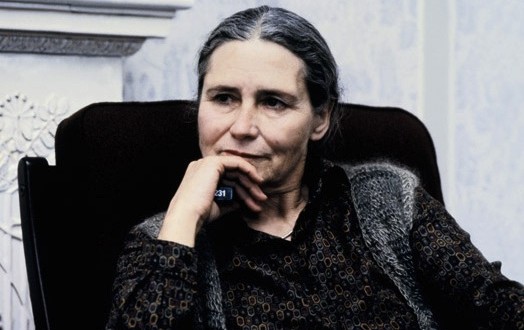The woman has trouble stepping out of the taxi. She is old, and the taxi sits higher off the ground than she might like. As she stoops to protect her head, the long red scarf that hangs from her neck nearly brushes the pavement. The woman is not only old; she is also short and, it has to be said, somewhat squat—a small woman with gray hair tied back and stiff ankles cased in stockings, putting out a hand to steady herself against the open door of the taxi as the driver jogs over to assist her, his engine still running. She’s too far along to accept his help. She steps down slowly, asks the fare, and only after reaching for her pocketbook does she look straight into the camera, now close on her face, and ask what is being photographed. “We’re photographing you,” says a man’s voice, almost shyly, the long cone of a microphone pushed suddenly into view. “Have you heard the news?”
Lessing was born in Iran on October 22, 1919 to British parents and was raised in Zimbabwe where she received her formal education. She was married twice and had three children, but the desire for personal freedom and intellectual development led her to seek out her own life in London, and following the divorce from her second husband in 1949 she did not marry again.
She was a divisive figure, never short of admirers, whose work was not confined by the expectations—nor the reactions—of the literary elite. Her 1962 novel, The Golden Notebook, was an epic work of female introspection that for many felt like the voice of their generation. In it Lessing effortlessly moved through a series of taboos including descriptions of menstruation and the female orgasm, as well as the rejection of motherhood for personal freedom.
She went on to write dozens more books including the Children of Violence sequence which depicts the social and intellectual development of a young woman as she navigates the culture and upheaval of the twentieth century, and the Canopus in Argus sequence which depicts the evolution of civilizations and cultures over huge stretches of time.
Lessing was known for her feisty and sometimes problematic opinions, such as her exhortation to feminists to stop the oppression of men, claiming that women’s advances had come “at a cost to men,” and her remarks shortly after receiving the Nobel Prize for Literature in 2007 that the events of September 11, 2001, were “terrible… [but] not that terrible.”
 Canada Journal – News of the World Articles and videos to bring you the biggest Canadian news stories from across the country every day
Canada Journal – News of the World Articles and videos to bring you the biggest Canadian news stories from across the country every day



